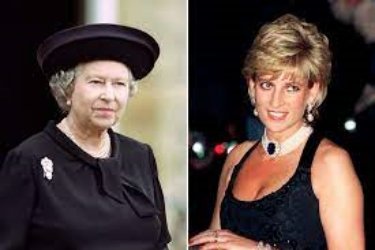“The Old Order Passeth”
Britain Sinking into the Sea, Elizabeth II, Modernity vs. Tradition, Princess Diana
Capel Lofft fears that when Queen Elizabeth passed on, she took with her the traditional values and virtues that made Britain admired world-wide.
There has been much talk since the Queen’s death — and indeed during the Platinum Jubilee celebrations — about how the Queen embodied certain admirable, old-fashioned ideals: commitment to duty, stoicism, discretion and so forth. Underlying many of these (entirely correct) statements is an undertone of regret that such sterling qualities are in such short supply now. She stood out in such sharp relief because the background of our culture and society has become so clearly marked by the opposite qualities. Exhibitionism. Emotional incontinence. The elevation of outward appearances and tacky self-promotion over substance, character and service. Flakiness, fragility and self-pity. We have become a society of precious, whining narcissists talking at and past each other, all whilst congratulating ourselves on our “openness” and being so pleased at how “modern” we are.
That by and large is what most people have wanted, or at least it’s a culture they have acquiesced in and often enthusiastically embraced. The death of Diana gave many people an excuse for openly parading just those values. A profound cultural shift was taking place. It found its symbolic apotheosis and triumph in those days of September 1997, and in the cheap emotionalism that Tony Blair proved himself so fluent in when he reacted to her death with his “People’s Princess” speech. The Queen stood against them, and the majority of the public hated her for it.
I don’t wish to comment on the character of Diana — no doubt in many ways she was a kindly woman with good motivations. But a sort of caricature of the worst elements that could be extracted from her life, or perhaps more accurately her public image — making a spectacle of oneself, ostentatious virtue-signalling, a lack of emotional self-control — has become the model for our culture for 25 years now. One reason why the death of the Queen is so painful and seems to herald such uncertain and disquieting times is because, in our heart of hearts, we’ve all become sick of it. We saw in the Queen one last outpost of the old values that most of us endorse but struggle to emulate because they are counter-cultural and unpopular and difficult to stick to. We embraced a Diana culture whilst deep down we knew that the Elizabeth morality we were leaving behind was superior.
Here are a few phenomena we’re probably all familiar with: The dead look behind the eyes of the Instagram influencer as they parade the latest shiny, fake incarnation of their carefully crafted “personal brand”. The hollow ring of the LinkedIn drone as they post their latest screed on wellbeing or diversity, or how they manage their “executive schedule”. The grotesque voyeurism of the Reality TV show peopled by walking advertisements for brands of fake tan who demean themselves by participating in a series of staged emotional “dramas” and tawdry public sexual acts in order to kickstart a 15 minute career as a professional strumpet. The blue-haired Twitter progressive activist who claims to be “literally shaking” or traumatised by some opinion they don’t agree with.
All of these things and a million more besides are a product of the society that we have created in defiance of all those old-fashioned values the Queen stood for, values that our institutions and, sadly, most of the public have spent decades spitting on, sniggering at and ignoring. Our elites routinely smear a predilection for tradition as “fustiness”, a dedication to duty as being “uptight”, stoicism as being “uncaring”, and a desire for privacy as being “out of touch” or “stiff”. Too many of us have bought into this narrative.
It seems to me to be more than a coincidence that this cultural shift, which was so sharply symbolised by the reactions to the death of Diana, came at a time of accelerating globalisation and the consolidation of an intensified, deregulated form of capitalism. The guiding principle of that new economic settlement was that anything and anyone can be commodified, ranging from individuals’ appearance and sexuality to a country’s history and aesthetics: think of “cool Britannia” and the emergence of Britain as a sort of marketing brand in the eyes of Blair and his successors. Emotional “openness”, self-obsession and vanity, perpetual and self-conscious public assertions of one’s fragility, vulnerability and need for the appropriate forms of therapy in response, the temper tantrums and grievances of self-righteous progressive identity politics: all are new cultural fissures that can be mined for profit.
There isn’t money to be made out of restraint, quiet commitment to duty and self-control. A political economy that has become so heavily dependent on monetising our personal vanity, exhibitionism and the crises of self-perception and emotional insecurity that inevitably result, despises those who are private, self-contained and resilient. Other than tourist tat and Corgi soft toys, the monarchy is one thing that cannot be commodified, strip-mined for its cultural assets. It’s an institution that depends for its success on cultivating those qualities that have become radically counter-cultural in a world of hyper-capitalism built upon the commodification of the spectacle: those qualities which our late Queen personified with such dignity and common sense.




